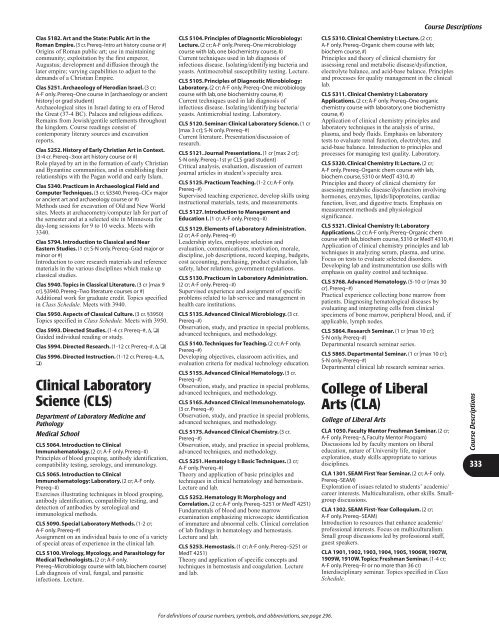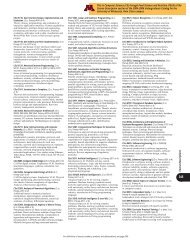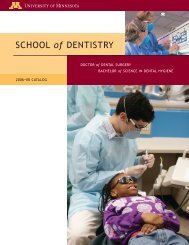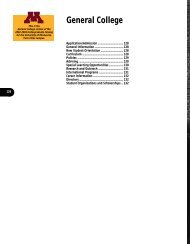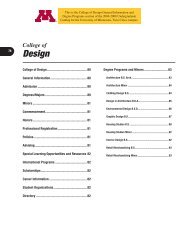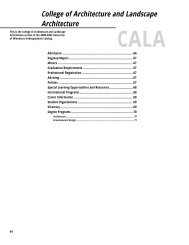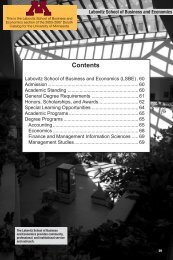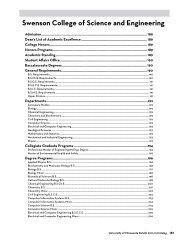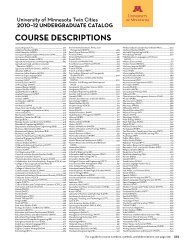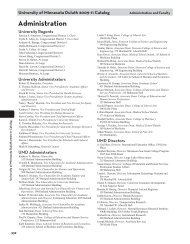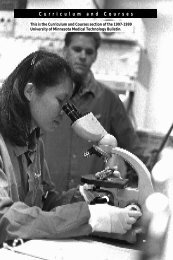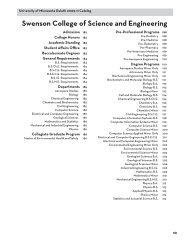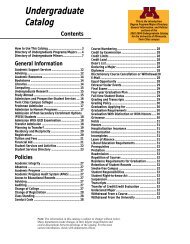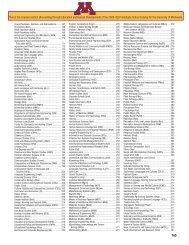CoursesâA through G and course numbers and symbols key
CoursesâA through G and course numbers and symbols key
CoursesâA through G and course numbers and symbols key
- No tags were found...
You also want an ePaper? Increase the reach of your titles
YUMPU automatically turns print PDFs into web optimized ePapers that Google loves.
Clas 5182. Art <strong>and</strong> the State: Public Art in theRoman Empire. (3 cr. Prereq–Intro art history <strong>course</strong> or #)Origins of Roman public art; use in maintainingcommunity; exploitation by the first emperor,Augustus; development <strong>and</strong> diffusion <strong>through</strong> thelater empire; varying capabilities to adjust to thedem<strong>and</strong>s of a Christian Empire.Clas 5251. Archaeology of Herodian Israel. (3 cr;A-F only. Prereq–One <strong>course</strong> in [archaeology or ancienthistory] or grad student)Archaeological sites in Israel dating to era of Herodthe Great (37-4 BC). Palaces <strong>and</strong> religious edifices.Remains from Jewish/gentile settlements <strong>through</strong>outthe kingdom. Course readings consist ofcontemporary literary sources <strong>and</strong> excavationreports.Clas 5252. History of Early Christian Art in Context.(3-4 cr. Prereq–3xxx art history <strong>course</strong> or #)Role played by art in the formation of early Christian<strong>and</strong> Byzantine communities, <strong>and</strong> in establishing theirrelationships with the Pagan world <strong>and</strong> early Islam.Clas 5340. Practicum in Archaeological Field <strong>and</strong>Computer Techniques. (3 cr. §3340. Prereq–ClCv majoror ancient art <strong>and</strong> archaeology <strong>course</strong> or #)Methods used for excavation of Old <strong>and</strong> New Worldsites. Meets at archaeometry/computer lab for part ofthe semester <strong>and</strong> at a selected site in Minnesota forday-long sessions for 9 to 10 weeks. Meets with3340.Clas 5794. Introduction to Classical <strong>and</strong> NearEastern Studies. (1 cr; S-N only. Prereq–Grad major orminor or #)Introduction to core research materials <strong>and</strong> referencematerials in the various disciplines which make upclassical studies.Clas 5940. Topics in Classical Literature. (3 cr [max 9cr]. §3940. Prereq–Two literature <strong>course</strong>s or #)Additional work for graduate credit. Topics specifiedin Class Schedule. Meets with 3940.Clas 5950. Aspects of Classical Culture. (3 cr. §3950)Topics specified in Class Schedule. Meets with 3950.Clas 5993. Directed Studies. (1-4 cr. Prereq–#, ∆, ❏)Guided individual reading or study.Clas 5994. Directed Research. (1-12 cr. Prereq–#, ∆, ❏)Clas 5996. Directed Instruction. (1-12 cr. Prereq–#, ∆,❏)Clinical LaboratoryScience (CLS)Department of Laboratory Medicine <strong>and</strong>PathologyMedical SchoolCLS 5064. Introduction to ClinicalImmunohematology. (2 cr; A-F only. Prereq–#)Principles of blood grouping, antibody identification,compatibility testing, serology, <strong>and</strong> immunology.CLS 5065. Introduction to ClinicalImmunohematology: Laboratory. (2 cr; A-F only.Prereq–#)Exercises illustrating techniques in blood grouping,antibody identification, compatibility testing, <strong>and</strong>detection of antibodies by serological <strong>and</strong>immunological methods.CLS 5090. Special Laboratory Methods. (1-2 cr;A-F only. Prereq–#)Assignment on an individual basis to one of a varietyof special areas of experience in the clinical lab.CLS 5100. Virology, Mycology, <strong>and</strong> Parasitology forMedical Technologists. (2 cr; A-F only.Prereq–Microbiology <strong>course</strong> with lab, biochem <strong>course</strong>)Lab diagnosis of viral, fungal, <strong>and</strong> parasiticinfections. Lecture.CLS 5104. Principles of Diagnostic Microbiology:Lecture. (2 cr; A-F only. Prereq–One microbiology<strong>course</strong> with lab, one biochemistry <strong>course</strong>, #)Current techniques used in lab diagnosis ofinfectious disease. Isolating/identifying bacteria <strong>and</strong>yeasts. Antimocrobial susceptibility testing. Lecture.CLS 5105. Principles of Diagnostic Microbiology:Laboratory. (2 cr; A-F only. Prereq–One microbiology<strong>course</strong> with lab, one biochemistry <strong>course</strong>, #)Current techniques used in lab diagnosis ofinfectious disease. Isolating/identifying bacteria/yeasts. Antimicrobial testing. Laboratory.CLS 5120. Seminar: Clinical Laboratory Science. (1 cr[max 3 cr]; S-N only. Prereq–#)Current literature. Presentation/discussion ofresearch.CLS 5121. Journal Presentations. (1 cr [max 2 cr];S-N only. Prereq–1st yr CLS grad student)Critical analysis, evaluation, discussion of currentjournal articles in student’s specialty area.CLS 5125. Practicum Teaching. (1-2 cr; A-F only.Prereq–#)Supervised teaching experience, develop skills usinginstructional materials, tests, <strong>and</strong> measurements.CLS 5127. Introduction to Management <strong>and</strong>Education I. (1 cr; A-F only. Prereq–#)CLS 5129. Elements of Laboratory Administration.(2 cr; A-F only. Prereq–#)Leadership styles, employee selection <strong>and</strong>evaluation, communications, motivation, morale,discipline, job descriptions, record keeping, budgets,cost accounting, purchasing, product evaluation, labsafety, labor relations, government regulations.CLS 5130. Practicum in Laboratory Administration.(2 cr; A-F only. Prereq–#)Supervised experience <strong>and</strong> assignment of specificproblems related to lab service <strong>and</strong> management inhealth care institutions.CLS 5135. Advanced Clinical Microbiology. (3 cr.Prereq–#)Observation, study, <strong>and</strong> practice in special problems,advanced techniques, <strong>and</strong> methodology.CLS 5140. Techniques for Teaching. (2 cr; A-F only.Prereq–#)Developing objectives, classroom activities, <strong>and</strong>evaluation criteria for medical technology education.CLS 5155. Advanced Clinical Hematology. (3 cr.Prereq–#)Observation, study, <strong>and</strong> practice in special problems,advanced techniques, <strong>and</strong> methodology.CLS 5165. Advanced Clinical Immunohematology.(3 cr. Prereq–#)Observation, study, <strong>and</strong> practice in special problems,advanced techniques, <strong>and</strong> methodology.CLS 5175. Advanced Clinical Chemistry. (3 cr.Prereq–#)Observation, study, <strong>and</strong> practice in special problems,advanced techniques, <strong>and</strong> methodology.CLS 5251. Hematology I: Basic Techniques. (3 cr;A-F only. Prereq–#)Theory <strong>and</strong> application of basic principles <strong>and</strong>techniques in clinical hematology <strong>and</strong> hemostasis.Lecture <strong>and</strong> lab.CLS 5252. Hematology II: Morphology <strong>and</strong>Correlation. (2 cr; A-F only. Prereq–5251 or MedT 4251)Fundamentals of blood <strong>and</strong> bone marrowexamination emphasizing microscopic identificationof immature <strong>and</strong> abnormal cells. Clinical correlationof lab findings in hematology <strong>and</strong> hemostasis.Lecture <strong>and</strong> lab.CLS 5253. Hemostasis. (1 cr; A-F only. Prereq–5251 orMedT 4251)Theory <strong>and</strong> application of specific concepts <strong>and</strong>techniques in hemostasis <strong>and</strong> coagulation. Lecture<strong>and</strong> lab.Course DescriptionsCLS 5310. Clinical Chemistry I: Lecture. (2 cr;A-F only. Prereq–Organic chem <strong>course</strong> with lab;biochem <strong>course</strong>, #)Principles <strong>and</strong> theory of clinical chemistry forassessing renal <strong>and</strong> metabolic disease/dysfunction,electrolyte balance, <strong>and</strong> acid-base balance. Principles<strong>and</strong> processes for quality management in the clinicallab.CLS 5311. Clinical Chemistry I: LaboratoryApplications. (2 cr; A-F only. Prereq–One organicchemistry <strong>course</strong> with laboratory; one biochemistry<strong>course</strong>, #)Application of clinical chemistry principles <strong>and</strong>laboratory techniques in the analysis of urine,plasma, <strong>and</strong> body fluids. Emphasis on laboratorytests to evaluate renal function, electrolytes, <strong>and</strong>acid-base balance. Introduction to principles <strong>and</strong>processes for managing test quality. Laboratory.CLS 5320. Clinical Chemistry II: Lecture. (2 cr;A-F only. Prereq–Organic chem <strong>course</strong> with lab,biochem <strong>course</strong>, 5310 or MedT 4310, #)Principles <strong>and</strong> theory of clinical chemistry forassessing metabolic disease/dysfunction involvinghormones, enzymes, lipids/lipoproteins, cardiacfunction, liver, <strong>and</strong> digestive tracts. Emphasis onmeasurement methods <strong>and</strong> physiologicalsignificance.CLS 5321. Clinical Chemistry II: LaboratoryApplications. (2 cr; A-F only. Prereq–Organic chem<strong>course</strong> with lab, biochem <strong>course</strong>, 5310 or MedT 4310, #)Application of clinical chemistry principles <strong>and</strong> labtechniques in analyzing serum, plasma, <strong>and</strong> urine.Focus on tests to evaluate selected disorders.Developing lab <strong>and</strong> instrumentation use skills withemphasis on quality control <strong>and</strong> technique.CLS 5768. Advanced Hematology. (5-10 cr [max 30cr]. Prereq–#)Practical experience collecting bone marrow frompatients. Diagnosing hematological diseases byevaluating <strong>and</strong> interpreting cells from clinicalspecimens of bone marrow, peripheral blood, <strong>and</strong>, ifapplicable, lymph nodes.CLS 5864. Research Seminar. (1 cr [max 10 cr];S-N only. Prereq–#)Departmental research seminar series.CLS 5865. Departmental Seminar. (1 cr [max 10 cr];S-N only. Prereq–#)Departmental clinical lab research seminar series.College of LiberalArts (CLA)College of Liberal ArtsCLA 1050. Faculty Mentor Freshman Seminar. (2 cr;A-F only. Prereq–∆, Faculty Mentor Program)Discussions led by faculty mentors on liberaleducation, nature of University life, majorexploration, study skills appropriate to variousdisciplines.CLA 1301. SEAM First Year Seminar. (2 cr; A-F only.Prereq–SEAM)Exploration of issues related to students’ academic/career interests. Multiculturalism, other skills. Smallgroupdiscussions.CLA 1302. SEAM First-Year Colloquium. (2 cr;A-F only. Prereq–SEAM)Introduction to resources that enhance academic/professional interests. Focus on multiculturalism.Small group discussions led by professional staff,guest speakers.CLA 1901, 1902, 1903, 1904, 1905, 1906W, 1907W,1909W, 1910W. Topics: Freshman Seminar. (1-4 cr;A-F only. Prereq–Fr or no more than 36 cr)Interdisciplinary seminar. Topics specified in ClassSchedule.Course Descriptions333For definitions of <strong>course</strong> <strong>numbers</strong>, <strong>symbols</strong>, <strong>and</strong> abbreviations, see page 296.


